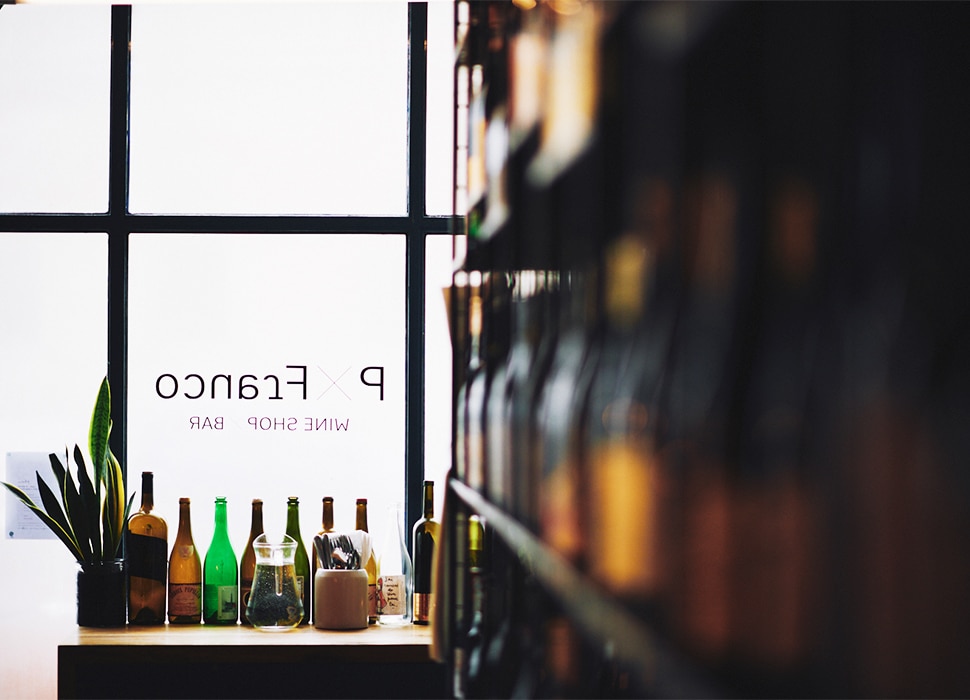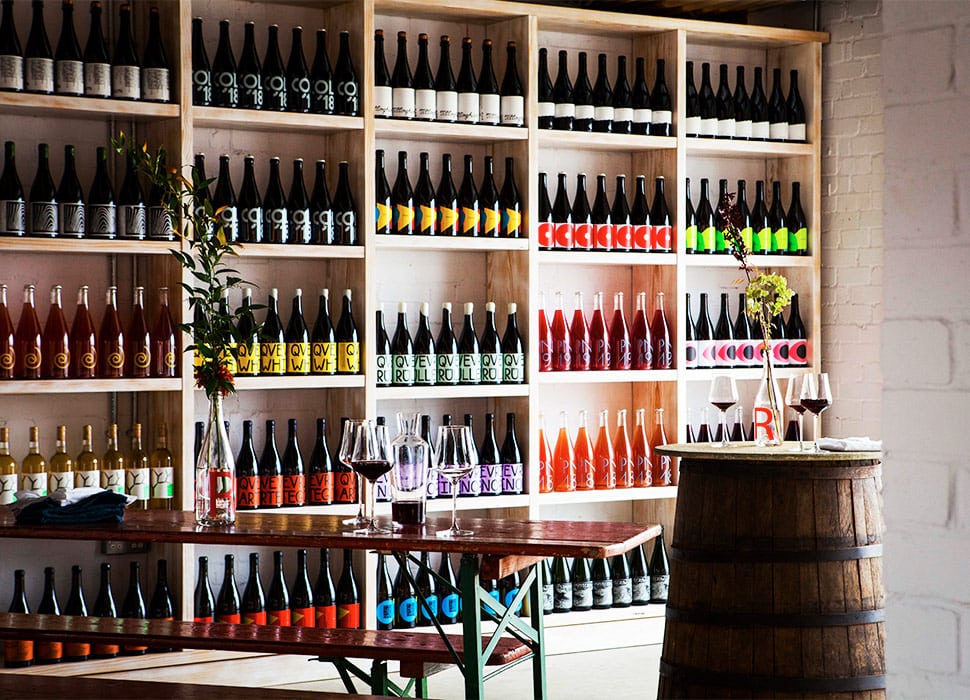3. La Buvette, Paris
This Parisian staple is a standout in a crowded city / Image: STUDIO ONZE
Of course, it’s madness to mention to just one natural wine bar in Paris – there’s a bunch: Aux Deux Amis, L’Entrée des Artistes, Septime Cave, we could go on – but, for its simple but hugely alluring space, and dependably inexpensive and unorthodox by-the-glass options, owner Camille Fourmont’s boîte in the 11th gets the top mention. It’s a glorious homage to simplicity: off-beat wine, good food, pleasingly mixed crowd. But no reservations so, with space for only 15 drinkers, come early.
67 Rue Saint-Maur, Paris
labuvette.paris
4. JaJa, Berlin
Small and sweet is the approach at Neukölln's JaJa
Etienne Dodet and Julia Giese’s small but perfectly formed bar in Neukölln district is the duo’s attempt to bring the petite, casual wine bars they used to run in Paris to Berlin. Hence the name – “jaja” is French slang for everyday drinking wine. Though, with 300-odd bottles in the cellar, their wine list offers way more than that. Expect a bias for French bottles but also some interesting, hard-to-find labels from Germany and Austria, too. Chef Yailen Munoz Diaz makes sure the food is no sideshow.
Weichselstraße 7, Berlin
jajawein.de
5. Glou Glou, Amsterdam
It was probably inevitable that at least one bar in the world was going to take its name from the now widely used natural wine term ‘glou glou’ – French for easygoing, gluggable wine and synonymous with the lighter end of the natty stuff. But, hey, when the wine list is as fairly priced as this cosy De Pijp standard-setter, then we’re not complaining. Expect a wine-savvy but friendly crowd and a beginner-happy menu that offers 20 wines by the glass among bottles from well-known names like glou-glou-iste sans pareil Axel Prüfer.
Tweede van der Helststraat 3, Amsterdam
glouglou.nl
6. Tyge & Sessil, Stockholm
Tyge & Sessil is an upmarket option in the Swedish capital / Image: Mathias Nordgren
Stockholm is another city gleefully chock-full of low-intervention wine bars but, if we had to pick only one, we’d go for sommelier Maximilian Mellfors and celeb chef Niklas Ekstedt’s vincafé in fancy Östermalm. Despite the pedigree behind the place, choose right and it’s still kinda affordable, with a rare emphasis on natural New World bottles. Still, if something vibey in the mould of Paris’s La Buvette is more your thing, honourable mention goes to the more casual, less pricey Savant Bar in Vasastan.
Brahegatan 4, Stockholm
tygesessil.se
7. P Franco, London
Clapton's minuscule natural go-to has a huge reputation / Image: Benjamin McMahon
London, it’s been said, has by far the most evolved natural wine scene anywhere in the world. The city is spoilt for restaurants and bars enviably well-stocked with some of the rarest bottles from France and the UK’s own producers, such as shapeshifting East Sussex vineyard Tillingham. Planque in Haggerston is a contender for London’s hottest natural wine table, but Clapton’s 107 Wine Shop & Bar (formerly P Franco) also gets a very special shout. Or for something more central, Bar Crispin has set up in Soho.
107 Lower Clapton Road, London
107wine.co.uk
8. Vino Vero, Lisbon
Vino Vero is a recent staple in Lisbon's natty scene
While the excellent restaurant Tati deserves a mention for introducing natural wines to Lisbon as far back as 2011, the Portuguese capital didn’t really have a bona fide low-intervention wine bar until the opening of Giulia Capaccioli and Massimiliano Bartoli’s space in 2019. It was an immediate hit, and deservedly so – Vino Vero brings all the easygoing charm of the pair’s Venice bar to Graça district but with a wine list that goes big on delightfully affordable bottles from Portuguese producers (think, a Folias de Baco pet-nat rosé for €20 – yes please).
Travessa do Monte 30, Lisbon
vinovero.wine
9. Veltlin, Prague
Veltlin's list leans proudly local / Image: Natalie Sevcikova
A chic space in Prague’s Karlín district, winemaker-poet Bogdan Trojak’s opening is now the city’s autentický vinný bar of record and specialises in bottles from the former Austro-Hungarian empire, with a happy bias towards the broadly unsung wines of the Czech Republic itself (yes, that includes the excellent Milan Nestarec). Huge potential for geekery, then, but don’t let that put you off; the friendly staff are well drilled when it comes introducing their wines to newcomers with a daily-changing roster of by-the-glass options.
Křižíkova 488/115, Czech Republic
veltlin.cz/en
10. Bar du Canal, Brussels
If a half-dozen Fine de Claire oysters and a chilled glass of pet-nat is your idea of a good time then this attractive, BS-free, canalside corner-bar in Brussels’ Dansaert district is your ticket. Expect a crowd most evenings but, happily, none of the airs and graces associated with wine buffery. The staff are doubly friendly and no one really cares if you don’t already have a preferred list of zero-zero Beaujolais. Check ahead for ‘kitchen takeovers’ from guest chefs and plan to linger: it’s loads of fun.
Rue Antoine Dansaert 208, Brussels
instagram.com/barducanal
What about vineyards?
Feted vigneron Frank Cornelissen's Sicilian vineyard
“OK, I’m in. Can I visit a natural winery?”
Well, yes and no. There are far fewer low-intervention wineries open to guests than conventional vignerons. And there are a number of reasons for that. First is the obvious one: still only a tiny niche in the broader wine world, there are just fewer of them. And they’re relatively new, so some of them simply don’t have the infrastructure to host visitors. But supply might be the bigger problem: with production small and demand from restaurants, bars and importers worldwide seriously high, many producers export almost everything they produce. So what’s left to taste?
The technicolour bottle shop at Tillingham, near Rye in East Sussex
Still, as with everything in wine, they are exceptions. In Jura, vin jaune grandee Jean-François Ganevat doesn’t have a website but a number of Google reviews suggest a cold call to pre-book a visit might work. Otherwise, with its buzzed-about restaurant and boutique barn hotel, Tillingham in East Sussex might offer one of the most complete winery visits in the UK. In Sicily, highly repped natural producer Frank Cornelissen is open to pre-booked visitors at his volcanic winery on the slopes of Mount Etna.
But if you want to hit up a few in a day then the Loire Valley, the French stronghold for experimental wine, might be the best bet: top growers that welcome visits include Terre de L’Elu, Grololo & Co and Les Vignes Herbel, among others.









